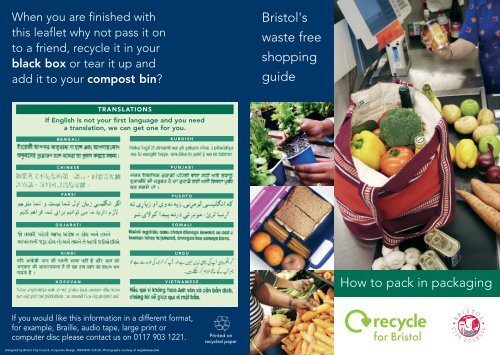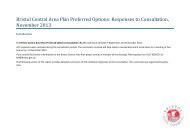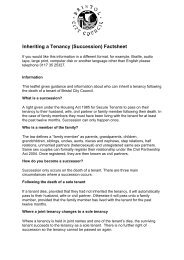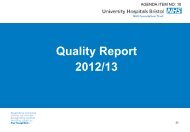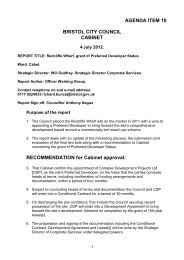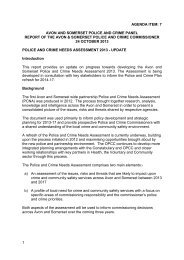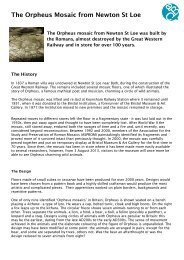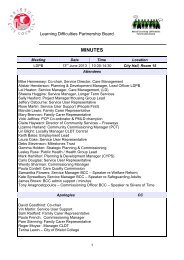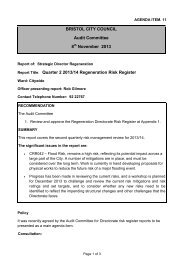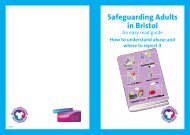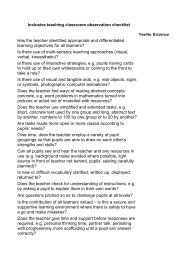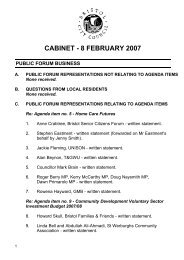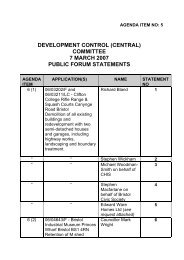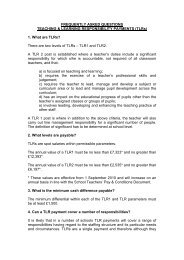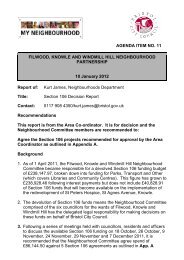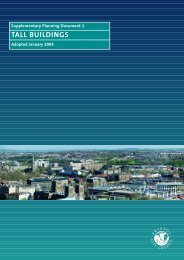Shopping guide - Bristol City Council
Shopping guide - Bristol City Council
Shopping guide - Bristol City Council
You also want an ePaper? Increase the reach of your titles
YUMPU automatically turns print PDFs into web optimized ePapers that Google loves.
When you are finished with<br />
this leaflet why not pass it on<br />
to a friend, recycle it in your<br />
black box or tear it up and<br />
add it to your compost bin?<br />
TRANSLATIONS<br />
If English is not your first language and you need<br />
a translation, we can get one for you.<br />
BENGALI<br />
CHINESE<br />
FARSI<br />
GUJARATI<br />
HINDI<br />
KOSOVAN<br />
If you would like this information in a different format,<br />
for example, Braille, audio tape, large print or<br />
computer disc please contact us on 0117 903 1221.<br />
Designed by <strong>Bristol</strong> <strong>City</strong> <strong>Council</strong>, Corporate Design. GRA4618. Feb 06. Photographs courtesy of recyclenow.com<br />
KURDISH<br />
PUNJABI<br />
PUSHTO<br />
SOMALI<br />
URDU<br />
VIETNAMESE<br />
Printed on<br />
recycled paper<br />
<strong>Bristol</strong>'s<br />
waste free<br />
shopping<br />
<strong>guide</strong><br />
How to pack in packaging
Are you shopping<br />
for rubbish?<br />
The choices you make whilst shopping significantly affect the<br />
amount of rubbish sent to landfill. It is estimated that for every<br />
tonne of household rubbish produced, another 10 tonnes of<br />
waste is created in manufacturing and packaging the product.<br />
Next time you are in the supermarket think about the items you<br />
are going to buy and recognise how much waste they will<br />
produce. This <strong>guide</strong> will help you to reduce waste and save<br />
money by making small changes to your shopping habits. Not<br />
only will this reduce your waste but it will also save you money.<br />
At the shops<br />
■ Make a list. Plan your shopping<br />
needs and jot them down. You<br />
will save money, time and never<br />
have that feeling that you have<br />
forgotten something.<br />
■ Don’t buy more than you need.<br />
Keep an eye on items that you<br />
keep buying but go off, or pass<br />
their sell by date before you<br />
use them. Up to 40% of all food<br />
purchases are thrown away.<br />
■ Don’t be caught out by 2 for 1<br />
offers on items that go off easily;<br />
only buy what you need.<br />
Packaging<br />
Plastic carrier bags<br />
▼<br />
fact The UK generates around<br />
▼<br />
fact<br />
10 million tonnes of<br />
packaging waste every year – almost<br />
10% of the total waste generated.<br />
Supermarkets are legally required to<br />
recover or recycle a percentage of<br />
packaging from the goods they sell<br />
(Producer Responsibility – Packaging<br />
Waste Regulations 2005).<br />
In addition to this Asda, Boots,<br />
Budgens, the Co-operative Group,<br />
Londis, Iceland, Kwik Save, Marks<br />
& Spencer, Morrisons, Sainsbury’s,<br />
Somerfield, Tesco and Waitrose have<br />
all joined forces with WRAP (the<br />
Waste & Resources Action<br />
Programme). They have pledged to:<br />
■ stop an increase in packaging<br />
waste by 2008.<br />
■ make reductions in packaging<br />
waste by March 2010.<br />
■ identify ways to tackle the<br />
problem of food waste.<br />
▼<br />
act<br />
Buy food with less<br />
packaging and avoid<br />
‘single portion packaging’.<br />
Fill in a customer comment card at<br />
your supermarket asking them to<br />
use less packaging.<br />
Some 150 million plastic<br />
carrier bags are used in<br />
the UK every week. Each one takes<br />
up to 500 years to decay in a<br />
landfill site.<br />
The wastefulness of the single-use<br />
plastic carrier bag is something we<br />
can all avoid.<br />
▼<br />
act<br />
Refuse<br />
plastic<br />
bags where<br />
possible. If there<br />
is a paper bag<br />
option, use that<br />
and recycle them<br />
in your black box<br />
or compost<br />
them later.<br />
Keep a few reusable shopping bags<br />
in the car or near the front door.<br />
Keep a small cotton bag folded in<br />
your bag so that you’ll always have<br />
one to hand.<br />
If you forget your own bag, re-use<br />
the shop’s carrier bags for lining<br />
rubbish bins, or other jobs around<br />
the house.<br />
Consider using a delivery service (it<br />
can be better to have one van<br />
supplying an area than dozens of<br />
people using their cars). Unpack the<br />
goods at once; you can give the<br />
plastic bags back to the driver,<br />
asking for them to be reused.
How to pack in<br />
packaging<br />
Tin foil and<br />
aluminium and<br />
steel cans<br />
fact<br />
▼<br />
Every year in the UK<br />
almost 5 billion drinks<br />
in aluminium cans are consumed.<br />
Around 80 million steel and<br />
aluminium cans end up in landfill<br />
sites every day. An aluminium can<br />
sent for recycling today can be made<br />
into a new one, filled and be back on<br />
the shelf in just six weeks.<br />
act<br />
▼<br />
Recycle your tins, cans and<br />
foil in your black box or at<br />
your local recycling centre.<br />
Reuse foil trays as seed trays or use<br />
them for freezing leftovers.<br />
Buy grease proof paper instead of<br />
tin foil for wrapping sandwiches, this<br />
can then be torn up and composted<br />
afterwards.<br />
Plastic containers<br />
fact<br />
▼<br />
Many plastic containers<br />
cannot be “easily”<br />
recycled. However some yoghurt<br />
pots are made of thin plastic, but<br />
have a cardboard cover which can be<br />
torn off and recycled or composted.<br />
Try to buy these yoghurt pots and<br />
not the thick plastic type – these<br />
cannot be recycled at present.<br />
act<br />
▼<br />
Try and reuse as many<br />
plastic containers as<br />
possible. Use plastic pots for<br />
seedlings or as paint pots for<br />
children. Ice cream<br />
tubs can be used to<br />
store children’s toys,<br />
leftovers in the<br />
fridge, or other<br />
items in the kitchen<br />
and garage and for<br />
packed lunches.<br />
Polythene and<br />
cling film<br />
fact<br />
▼<br />
Fruit, vegetables, meat,<br />
bakery produce and ready<br />
meals are usually sold covered in<br />
either polythene (LDPE) or cling film<br />
(PVC). The trays are made of a<br />
different sort of plastic and they<br />
sometimes have an absorbent square<br />
of porous material placed at the base<br />
of the tray. This absorbs any<br />
moisture. A paper label is then stuck<br />
on the goods. The packaging now<br />
consists of a range of incompatible<br />
plastics, paper, and glue – a<br />
recycler’s nightmare!<br />
act<br />
▼<br />
Try to avoid pre-packaged<br />
goods altogether. Buy<br />
loose rather than pre-packed fruit<br />
and vegetables. This way you get the<br />
amount you actually need. Try to<br />
avoid over-packaged ready meals,<br />
and buy meat and fish from the<br />
appropriate<br />
counters where<br />
you will get less<br />
packaging.<br />
Polythene<br />
wrappers and<br />
bags from<br />
magazines and<br />
newspapers can be<br />
recycled if you post<br />
them to Polyprint at<br />
your own expense<br />
(address below).<br />
Please remove any labels and add<br />
your name and address, so you can<br />
be contacted if there is a query<br />
about the type of plastic you are<br />
sending. It takes approximately<br />
200,000 polythene wrappers to<br />
make one tonne of recyclable waste,<br />
which is turned into black plastic bin<br />
liners and fertiliser sacks.<br />
Send your polythene wrappers and<br />
bags to: Polyprint Mailing Films,<br />
Mackintosh Road, Rackheath<br />
Industrial Estate, Rackheath, Norwich<br />
NR13 6LJ Telephone 01603 721807.
Plastic bottles<br />
fact<br />
▼<br />
If plastic bottles have a<br />
triangle symbol, the letters<br />
PET or HDPE and numbers 1, 2, or 3,<br />
they are high-grade plastic. This can<br />
be recycled and made into fleece<br />
clothing, drain pipes or garden<br />
furniture.<br />
act<br />
▼<br />
Recycle plastic bottles at<br />
the Household Waste<br />
Recycling Centres (at St Philips<br />
and Avonmouth) or at local recycling<br />
centres across the city. Wash and<br />
squash them first. To find out where<br />
your nearest plastic bottle recycling<br />
bank is visit www.recyclemore.co.uk<br />
It’s easy to use, just enter your<br />
postcode or look on www.bristolcity.gov.uk/recycling<br />
Alternatively you can reuse plastic<br />
bottles in the garden!<br />
Cardboard<br />
fact<br />
▼<br />
Recycled cardboard is<br />
primarily used to make<br />
boxes and other packaging, but has<br />
a range of other uses including<br />
stationery, animal bedding and<br />
even coffins!<br />
act<br />
▼<br />
Recycle your cardboard at<br />
the Household Waste<br />
Recycling Centres at St Philips and<br />
Avonmouth. Egg boxes and toilet<br />
rolls can be used in craft projects.<br />
Alternatively, you can compost some<br />
cardboard. Just scrunch it up and<br />
throw it in with other kitchen scraps.<br />
It will provide some air pockets and<br />
absorb some moisture, and will help<br />
to produce a high quality compost.<br />
Tetra Pak<br />
fact<br />
▼<br />
Tetra Pak is used to<br />
package milk, juice and<br />
soup. It is made up of 75% paper,<br />
20% polyethylene and 5% aluminium.<br />
Composite materials are hard to<br />
recycle. At present, there is only<br />
one recycling plant in the UK, and<br />
the onus is on the consumer, not the<br />
producer.<br />
Tetra Paks<br />
are pulped<br />
and the<br />
recovered<br />
fibre is<br />
made into<br />
paper<br />
products<br />
such as fast<br />
food bags.<br />
act<br />
▼<br />
Buy juice and soup in<br />
plastic or glass bottles that<br />
can be recycled. Buy your milk from a<br />
milk delivery service. Delivery jobs are<br />
now under threat as more people<br />
pick up cartons or plastic bottles in<br />
the shops.<br />
You can send rinsed and flattened<br />
Tetra Pak cartons, at your own<br />
expense to Smith Anderson and Co,<br />
Fettykil Mills, Nr Glenrothes, Fife,<br />
KY6 3AQ (01592 746000).<br />
Address labels can be downloaded<br />
from www.drinkscartons.com/docs/<br />
recycling_uk.htm<br />
Glass bottles<br />
and jars<br />
fact<br />
▼<br />
To reuse is better than to<br />
recycle. A milk bottle is<br />
the perfect example of practical,<br />
eco-friendly packaging, reusable up<br />
to 30 times. The average glass bottle<br />
contains over 25% recycled glass.<br />
Green glass bottles manufactured<br />
in this country contain at least 60%<br />
and sometimes as much as 90%<br />
recycled glass. Clear glass is easier<br />
to recycle.<br />
act<br />
▼<br />
Buy<br />
your<br />
milk from a milk<br />
delivery service if<br />
available. Recycle<br />
all your glass<br />
bottles and<br />
jars in your<br />
black box or<br />
at your local<br />
recycling centre.
Refillable and<br />
rechargeable<br />
Choose to buy refillable and<br />
rechargeable products instead of<br />
disposable. You will immediately<br />
make a difference to the amount<br />
of waste you generate. The types<br />
of product that can be refilled are<br />
washing powder, fabric conditioner<br />
and printer cartridges. Refilled<br />
alternatives are often cheaper.<br />
Check with local shops if they<br />
supply any refillable products.<br />
Consider using<br />
rechargeable<br />
batteries, and avoid<br />
disposable products<br />
such as nappies,<br />
razors, plastic cutlery,<br />
plates, cameras,<br />
and tissues.<br />
If refillable containers are not an<br />
option, try to purchase goods in<br />
large containers rather than multipacks<br />
containing single portions<br />
like breakfast cereals and drinks.<br />
How to deal<br />
with food waste<br />
In 2006 <strong>Bristol</strong> <strong>City</strong><br />
<strong>Council</strong> will start<br />
collecting kitchen<br />
waste, cardboard<br />
and garden waste<br />
from the kerbside<br />
for composting. However, if you want<br />
to make your own compost to use in<br />
your garden you can compost all of<br />
your uncooked vegetable and fruit<br />
waste, eggshells, tea bags and some<br />
cardboard. <strong>Bristol</strong> <strong>City</strong> <strong>Council</strong> sell<br />
three sizes of compost bins for £14<br />
which can be picked up or delivered<br />
to your door (£3 delivery fee).<br />
Compost bins can be ordered on line<br />
at: www.bristol-city.gov.uk/recycling<br />
or phone 0117 903 1221 to request a<br />
compost bin order form.<br />
If you want to put all of your kitchen<br />
waste in one place regardless of<br />
whether it’s cooked or not and<br />
regardless of whether its meat, fish<br />
or bread your best bet is a Green<br />
Cone. This is a perfectly safe system<br />
whereby you partially bury the cone<br />
in your garden and all kitchen waste,<br />
including chicken bones and fish<br />
skins, can go in. You can even put cat<br />
and dog poo into the Green Cone.<br />
This rots down in a sealed container<br />
and is released back into the soil<br />
beneath the ground’s surface. Visit<br />
www.greencone.com or phone 0800<br />
731 2572 for more information.<br />
Helpful<br />
hints<br />
Remember to take your recyclables<br />
when you go to the supermarket.<br />
Most supermarkets have recycling<br />
banks in the car parks. Many<br />
supermarkets also have recycling<br />
points for used plastic bags.<br />
When choosing items remember<br />
what recycling facilities exist near<br />
you. Glass can be recycled in the<br />
black box or taken to a local<br />
recycling centre. For example try to<br />
buy your ketchup in a glass bottle<br />
rather than a plastic one.<br />
If you make too much<br />
food, you can try to use the leftovers<br />
in a separate recipe – use your<br />
imagination, after all, that’s how<br />
shepherds pie was invented!<br />
If you follow all of the above advice,<br />
the food waste in your wheeled bin<br />
will reduce significantly. You<br />
probably would have saved<br />
yourself some money too, and<br />
think how you could spend it!<br />
Buy recycled<br />
Lots of products on the market, such<br />
as toilet rolls, kitchen towels, tissues,<br />
writing paper, bin liners, pens, rulers<br />
and plant pots are available made<br />
from recycled materials. Many ideas<br />
for home, work, school and the<br />
garden can be found at:<br />
■ www.recyclenow.com<br />
■ www.recycledproducts.org.uk<br />
■ www.greenchoices.org.uk<br />
■ www.ecomall.com<br />
■ www.greenshop.co.uk<br />
■ www.cat.org.uk<br />
Things to try at<br />
least once……<br />
■ Try on-line shopping – and reuse<br />
any packaging.<br />
■ Try a home delivery from a<br />
local supplier.<br />
■ Use a milk delivery service.<br />
■ Buy recycled products.<br />
■ Get a bag for life or reuse plastic<br />
bags to carry your shopping.<br />
■ Buy concentrated<br />
items like squash.<br />
■ Make up a<br />
waste free<br />
lunch<br />
box.
Recycling symbols<br />
There are a number of symbols, which commonly appear on<br />
packaging products. Some of these indicate whether the item<br />
is recyclable, whilst others show the recycled material content.<br />
Metals<br />
All drink and food cans made from<br />
steel and aluminium can be recycled.<br />
Look out for the following symbols.<br />
Cardboard<br />
Recyclable aluminium<br />
or<br />
Recyclable steel<br />
All cardboard can be recycled.<br />
The above symbol, (called the<br />
Mobius loop), is most commonly<br />
found on cardboard packaging and<br />
shows that the item is recyclable. If<br />
the centre of the loop contains a<br />
number, this means that the item is<br />
made from a certain percentage of<br />
recycled materials.<br />
Another symbol often<br />
displayed on paper and<br />
cardboard packaging is<br />
the RESY recycling symbol. This<br />
symbol guarantees that packaging<br />
with this symbol is recyclable and will<br />
be accepted by cardboard recyclers.<br />
Glass<br />
All glass containers are<br />
recyclable, this symbol<br />
reminds consumers to<br />
recycle glass jars and bottles, at<br />
your local recycling centre or in the<br />
black box.<br />
Plastics<br />
There are a variety of plastic<br />
containers. Types 1, 2 and 3 are<br />
usually bottles and can be recycled<br />
in plastic bottle banks in <strong>Bristol</strong>.<br />
PET Polyethylene<br />
terephthalate – Fizzy<br />
drink bottles and ovenready<br />
meal trays.<br />
HDPE High-density<br />
polyethylene – Bottles for<br />
milk and washing-up<br />
liquids.<br />
PVC Polyvinyl chloride –<br />
Food trays, cling film,<br />
bottles for squash, mineral<br />
water and shampoo.<br />
LDPE Low density<br />
polyethylene – Carrier<br />
bags and bin liners.<br />
PP Polypropylene –<br />
Margarine tubs,<br />
microwaveable meal trays.<br />
PS Polystyrene – Yoghurt<br />
pots, foam meat or fish<br />
trays, hamburger boxes<br />
and egg cartons, vending<br />
cups, plastic cutlery,<br />
protective packaging for<br />
electronic goods and toys.<br />
Other plastics<br />
Any other plastics that do<br />
not fall into any of the<br />
above categories.<br />
An example is melamine, which is<br />
often used in plastic plates and cups.<br />
This symbol, the German<br />
‘Green Dot’, often<br />
appears on packaging.<br />
This does not have an<br />
environmental significance. It means<br />
that the manufacturer has paid a fee<br />
towards the packaging recovery<br />
system in Germany.<br />
The European Eco-label<br />
has been developed<br />
by the European Union. It<br />
encourages the<br />
development of products<br />
which keep the impact on<br />
the environment to a minimum. It is<br />
a voluntary scheme and the ‘flower’<br />
symbol is awarded to products that<br />
meet certain criteria. About 400<br />
products – from washing machines to<br />
footwear – currently carry the label.<br />
Search for Eco-labelled products at<br />
www.eco-label.com<br />
For more information<br />
on packaging<br />
■ Industry <strong>Council</strong> for Packaging and<br />
the Environment www.incpen.org<br />
■ Waste Online<br />
www.wasteonline.org.uk/<br />
resources/InformationSheets/<br />
Packaging.htm<br />
Recycling<br />
information<br />
Recycling Team,<br />
Waste Services,<br />
<strong>Bristol</strong> <strong>City</strong> <strong>Council</strong>,<br />
Brunel House,<br />
St George’s Road,<br />
<strong>Bristol</strong>, BS1 5UY.<br />
Telephone: 0117 903 1221<br />
Email: recycling@bristol-city.gov.uk<br />
www.bristol-city.gov.uk/recycling


